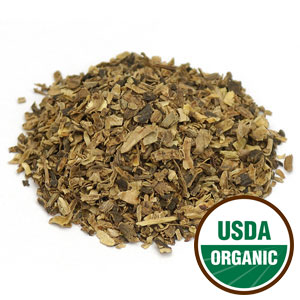Black Cohosh
Cimicifuga racemosa
| Botanical Name |
Cimicifuga
racemosa |
| Common Name |
Black Cohosh, black
snakeroot, rattleweed |
| Parts Used |
Root and Rhizomes |
| Historical |
Blood cleanser, Pain reliever,
Expectorant, anti-inflammatory |
| How to use |
Tea, extract & capsules |
| Combinations |
soy, cramp bark, wild yam, red raspberry
leaf, dang qui, borage |
Bodily
Influences:
Black cohosh is powerful herbal support
for women, clinically shown to reduce the hot flashes, mood
swings and irritability associated with menopause. 1st
Chinese Herbs offers you black cohosh extract standardized
to the same marker compounds found clinically effective in
scientific research.
Black Cohosh contains natural estrogen, (phytoestrogens)
the female hormone and is a specific for female problems.
Black Cohosh helps in hot flashes, mood swings and dryness,
that is associated with menopause. Black cohosh is used as
an emmenagogue. An herb that promotes menstrual or
uterine bleeding. Chinese and Western Herbalists regard it a
sedative emmenagogue, implying it promotes menses when
uterine tension, cramps, and congestion hinder flow. Black
cohosh relaxes the uterus, especially when tension is caused
by anxiety. Native Americans and European herbalists
have used this plant for centuries for menopausal symptoms,
and labor pains - inducing labor, but also used for
Rheumatism, Spasms, Insect Bites, Diarrhea, Coughs, and
Insomnia.
We have available the standardized form
which is 2.5% triterpene glycosides including
27-deoxyactein, one of the key constituents of the herb.
How
Does it Work?
(LH) released by the body in a futile
attempt to restore the declining estrogen levels that occur
as women enter premenopause. Scientists have not yet
determined exactly how black cohosh affects the hormonal
system. Research suggests black cohosh may reduce LH
secretion, thereby lessening hot flashes.
Lydia
E. Pinkham made this herb famous which she called a
vegetable herbal compound, that contained black cohosh and
was used by women early in the 20th century to ease
"all those painful complaints and weaknesses so common
to our best female population." The plant was also
considered helpful by the so-called Eclectic physicians who
practiced herbal medicine until the early 20th century. More
recently, the German Commission E approved its use for
painful menstruation and menopausal symptoms.
Caution / Safety
Black Cohosh should not be taken by pregnant women, unless
under medical supervision.
Mild gastric complaints are the most commonly
reported side effects. However, high doses may cause
vomiting, headaches and dizziness. Patients with aspirin
sensitivity should not use black cohosh since it contains
salicylates. There have been no documented interactions
between the herb and drugs. Because of lack of data, black
cohosh is not recommended for use by pregnant or
breast-feeding women or for use for longer than six months.
References - Prescription for Nutritional Healing by James Balch M.D.
and Phyllis Balch C.N.C.
The New Age Herbalist by Richard Mabey
The Little Herb Encyclopedia by Jack Ritchason N.D.
Brucker, A., M.D. Med
Welt 44:2331-3. Langfritze, W. Med Klin 57, 35:1497-9.
Steinler, K., M.D. Arztl Prax 11, 26: 916-7.
|